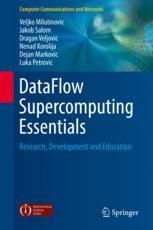

Most ebook files are in PDF format, so you can easily read them using various software such as Foxit Reader or directly on the Google Chrome browser.
Some ebook files are released by publishers in other formats such as .awz, .mobi, .epub, .fb2, etc. You may need to install specific software to read these formats on mobile/PC, such as Calibre.
Please read the tutorial at this link: https://ebookbell.com/faq
We offer FREE conversion to the popular formats you request; however, this may take some time. Therefore, right after payment, please email us, and we will try to provide the service as quickly as possible.
For some exceptional file formats or broken links (if any), please refrain from opening any disputes. Instead, email us first, and we will try to assist within a maximum of 6 hours.
EbookBell Team

5.0
48 reviewsThis informative text/reference highlights the potential of DataFlow computing in research requiring high speeds, low power requirements, and high precision, while also benefiting from a reduction in the size of the equipment. The cutting-edge research and implementation case studies provided in this book will help the reader to develop their practical understanding of the advantages and unique features of this methodology.
This work serves as a companion title to DataFlow Supercomputing Essentials: Algorithms, Applications and Implementations, which reviews the key algorithms in this area, and provides useful examples.
Topics and features: reviews the library of tools, applications, and source code available to support DataFlow programming; discusses the enhancements to DataFlow computing yielded by small hardware changes, different compilation techniques, debugging, and optimizing tools; examines when a DataFlow architecture is best applied, and for which types of calculation; describes how converting applications to a DataFlow representation can result in an acceleration in performance, while reducing the power consumption; explains how to implement a DataFlow application on Maxeler hardware architecture, with links to a video tutorial series available online.
This enlightening volume will be of great interest to all researchers investigating supercomputing in general, and DataFlow computing in particular. Advanced undergraduate and graduate students involved in courses on Data Mining, Microprocessor Systems, and VLSI Systems, will also find the book to be a helpful reference.